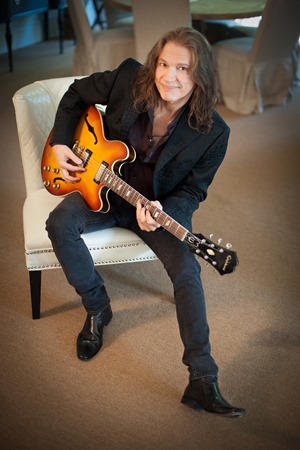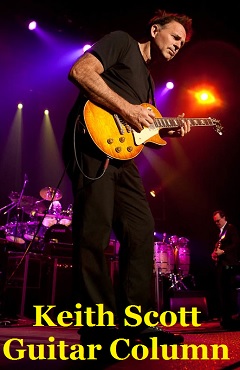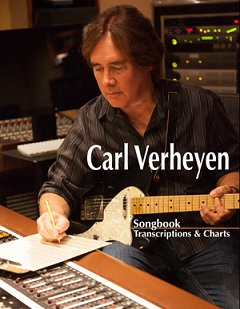Robben Ford

Photo : George Wells
Robben Ford has been well known as a great guitar player, continuously creating quality music and albums throughout his long musical career. His excellent tone and performance has fascinated countless music fans all around the world. Robben Ford has released “Bringing It Back Home”, a blues cover album also showing where his roots belong. The album displays a magnificent performance with a pleasant and emotional sound on the guitar. Check out what Robben Ford has to say about his new album “Bringing It Back Home”.

Photo : George Wells
Interview / Text Mamoru Moriyama
Translation Louis Sesto (EAGLETAIL MUSIC)
Muse On Muse : Can you give us some background as to how and why you decided to record the blues cover album “Bringing It Back Home”?
Robben Ford : I wanted to make a record that had an effortless quality to it, something that invited people in, literally, like inviting someone to your house. I also wanted a consistency to the sound of the guitar, playing in the blues style, without a lot of fuss over guitars, choice of pick-up, amps, etc.
MM : What’s the meaning behind the album title “Bringing It Back Home”?
RF : Just that homegrown feeling I was talking about.
MM : Please tell us about the musicians taking part in this album.
RF : Harvey Mason on drums who first came to people’s attention with The Headhunters (Herbie Hancock), David Piltch on bass who is a new acquaintance and just brilliant, Larry Goldings who has to be the greatest living organ player and Steve Baxter on trombone, which has become a very essential ingredient to this new music.
MM : How did you proceed with the recordings for this album?
RF : The music was conceived to allow the musicians to be themselves. Consequently the sessions went very smoothly, everything cut in three days with one short rehearsal the day before. I re-sang the songs of course but re-cut very little of the guitar. The record is 90% live I would say.
MM : “Everything I Do Gonna Be Funky” and “Fair Child” (Willie West) are 2 songs related to Allen Toussaint. What kind of influence has Allen Toussaint given you? Did you take any particular approach when recording his songs?
RF : Those songs were new to me as we’re most of the songs on the record. I looked outside my immediate musical world to find fresh inspiration. We cut them very close to the originals, again, in the spirit of not reinventing the wheel. Keeping it simple so that everyone could just “Play”.
MM : The original version of Charley Patton’s “Bird’s Nest Bound” seems to have a raw and earthy blues sound, whereas your version seems to sound a bit more sophisticated.
RF : Of course. I enjoy finding my own way to play things.

Photo : George Wells
MM : Bob Dylan’s “Most Likely You Go Your Way (And I’ll Go Mine)” was a harsh, straightforward song. In contrast, your version seems to have a majestic and grandeur feeling to it, thus expressing the magnificence of the song from a different viewpoint. What was your personal viewpoint on this song in regards to recording this tune?
RF : I had to do it in a way that felt right for me. Plus the musicians all brought a very “musical” approach to it. So these other things come out.
MM : “Oh, Virginia” and “On That Morning” are 2 of your original songs. What was the reason behind choosing these 2 songs out of the many blues songs that you wrote?
RF : Virginia was a nice surprise. I was happy to come up with something that to me sounds old and new at the same time. On That Morning is a traditional gospel song that I arranged hoping to get a little feeling of the Kind O Blue album from Miles Davis.
MM : The album features a song written by your wife, Ann Kerry Ford and Michael McDonald : “Traveler’s Waltz”. The song seems to have a laid back feeling and creates a great accent within the album. What was the reason behind choosing this song to be on the album?
RF : Anne wrote the lyric as a poem about my life on the road and I showed it to Michael. He liked it immediately, even the fact that it doesn’t rhyme, and starting writing the music. It’s a meaningful song to me and I thought it would fit the record.
MM : What aspect of blues music fascinates you the most?
RF : I don’t think I can truly say but it resonates with me somehow and has since I first heard it at age 13.
MM : Is there anything in particular you keep in mind when trying to express the blues in terms of guitar performance? What do you find most difficult when it comes to expressing the blues?
RF : Simplicity, space, honesty.
MM : Were there any new discoveries while recording this album as you went back into your musical roots?
RF : For the record: I did not go back to my roots as I’ve never left them. That said, being prepared to have the live recording be the final, complete performance was something I came away with.

Photo : George Wells
MM : Please tell us about your gear. What guitars, amps, effectors, foot pedals did you use for this recording? What kind of guitar pick(s) did you use? What kind of guitar strings did you use?
RF : My usual Dumble amp with a single twelve, open back cabinet. A ’60’s Epiphone Riviera played entirely on the rhythm pickup. Effects were done in mixing and are minimal. I use D’Addario heavy picks and 10 thru 46 strings.
MM : Do you have any tips for creating your guitar sound, both in the studio and for live situations?
RF : It’s in your hands, head and heart.
MM : Your guitar performances are always filled with great guitar phrases, awesome dynamics, and an excellent sense of rhythm. What’s the secret behind developing the guitar style you currently have?
RF : No secret, just a lot of listening, playing and desire to expressing something honest.
MM : Do you have any advice to young musicians that dream of becoming a great guitar player like you someday?
RF : Learn a lot of chord voicings. Also, concentrate on one style which in my case has been the blues. It’s a simple form that can expand into different things as you go along. I work at singing, write songs, play with a lot of different people but the Blues has always been my foundation. Also, listen to instruments other than the guitar. You sound like what you listen to. I listen to saxophone players and Miles Davis’ trumpet.
MM : You featured music created by our great predecessors on this album. On the other hand, are there any young and upcoming musicians that catch your attention? If there are any, please also tell us why.
RF : I like Derek Trucks. Also a guitar and Oud player in LA named Jimmy Malis. Very soulful.
MM : What do you have coming up next? Tell us about your upcoming schedule.
RF : I will tour the US, Europe and be in Japan in May as well as Korea. Lots of touring.
MM : Please give the Japanese fans a message.
RF : Love you.
Robben Ford Official Site : http://www.robbenford.com/

BRINGING IT BACK HOME / ROBBEN FORD
VICJ-61681 \ 2,625 Victor Entertainment
1.EVERYTHING I DO GONNA BE FUNKY
2.BIRDS NEST BOUND
3.FAIR CHILD
4.OH, VIRGINIA
5.SLICK CAPERS BLUES
6.ON THAT MORNING
7.TRAVELER’S WALTZ
8.MOST LIKELY YOU GO YOUR WAY AND I’LL GO MINE
9.TRICK BAG
10.FOOL’S PARADISE

